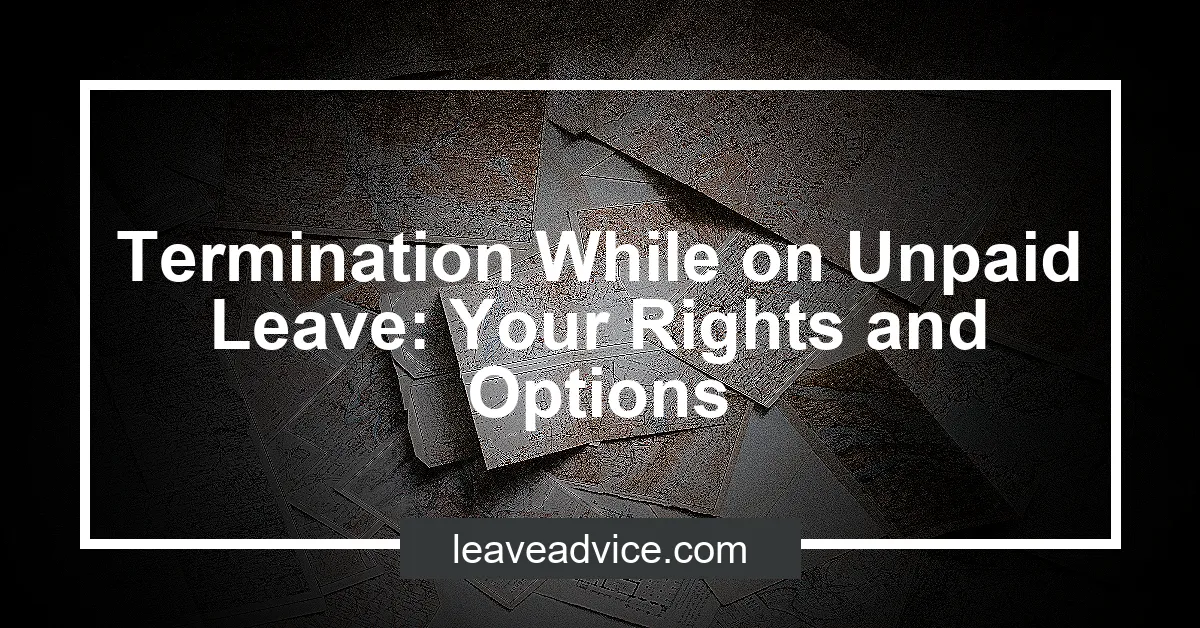Termination While on Unpaid Leave: Your Rights and Options
Termination while on unpaid leave is a concept that both employees and employers need to understand. According to the Fair Work Regulations 2009, if an employee is on unpaid leave for more than 13 weeks in a 52-week period, the employer may have the right to terminate their employment.
This can have legal implications for both parties, making it important to understand the entitlements and legality surrounding this issue.
Are you an employee who is currently on unpaid leave or is about to take unpaid leave? Check out this Youtube video: “5 Things you should know about employment contracts” which includes important information about termination while on unpaid leave.
Don’t let termination while on unpaid leave catch you off guard. Stay informed by watching this essential Youtube video: “5 Things you should know about employment contracts”.
Legality of Termination While on Unpaid Leave
When it comes to the legality of terminating an employee while on unpaid leave, there are specific regulations underlined in the Fair Work Regulations 2009. According to regulation 3.01, if an employee is absent from work on unpaid leave for more than 13 weeks within a 52-week period, the employer can terminate the employee.
This termination, however, does not fall under the protection of unfair dismissal laws or general protection laws.
In some cases, there may be no legal basis preventing the employer from terminating the employee during the period of unpaid leave, whether it be due to the employee’s misconduct or economic reasons. It should be noted, though, that the notice period cannot overlap the period of unpaid leave, and the notice will not be in effect until after the leave period has ended.
Employee Protections While on Unpaid Leave
When an employee takes unpaid leave, they are not receiving their normal pay but they do remain an employee of the company. However, if the employee is on unpaid leave for more than 13 weeks in a 52-week period, an employer may terminate their employment without being subject to unfair dismissal laws or general protection laws.
Despite the lack of protection against termination, employees are still entitled to certain protections while on unpaid leave. For instance, they may be entitled to benefits retention during the leave period.
Additionally, under the Family and Medical Leave Act (FMLA), eligible employees are entitled to up to 12 weeks of unpaid, job-protected leave per year with preserved medical benefits.
It is important to note that when an employee is terminated while on unpaid leave, the notice period cannot be combined with the period of unpaid leave. In other words, the notice period will not take effect until the period of unpaid leave has expired.
While termination while on unpaid leave can be a difficult and emotional experience, employees do have certain protections and rights that can help them during this time.
Exceptions to Employee Protections
Under the Fair Work Regulations 2009, regulation 3.01 allows for an employer to terminate an employee while on unpaid leave for more than 13 weeks in a 52-week period. However, there are certain exceptions to this rule.
1. Meeting Legitimate Business Needs
One of these exceptions is when the employer can justify the termination as a legitimate business need. This could include downsizing, restructuring, or other business necessities that can impact the company’s survival and profitability.
2. Employment Contract Violations
Another exception to the protection of employees on unpaid leave applies when the employee violates the terms of the contract. This could include failing to comply with the company policies and procedures during the leave of absence.
By understanding these cases, employees can avoid violating the terms of the contract and losing their jobs while on unpaid leave.
3. Frustration of Contract
The third exception is known as the legal concept of frustration of contract. It refers to situations in which an unforeseeable event occurs that renders the employment contract unenforceable or impracticable.
In this case, employees who are on unpaid leave may be affected, including the grounds for claims and litigation in cases of wrongful dismissal while on unpaid leave.
It is important for employees to understand the exceptions to employee protections while on unpaid leave. This will help them protect their employment rights and avoid situations where they could lose their jobs while on leave.
Employee’s Rights and Options
When it comes to termination while on unpaid leave, employees have some rights and options available to them. While an employer has the right to terminate an employee who has been on unpaid leave for more than 13 weeks in a year, this cannot be done without notice.
And even if an employee is not covered by such a provision, they may still be eligible for unpaid leave through the Family and Medical Leave Act with preserved medical benefits.
However, if an employee is engaging in another job during unpaid leave, this may be considered a breach of the loyalty obligation and may provide just cause for termination. In such cases, it is important for employees to understand their legal rights and protections, which may include union representation, fair labor practice enforcement agencies, and employment lawyers.
Additionally, employers should offer support to employees and communicate with them in an empathetic and compassionate manner.
Conclusion
It is important for both employers and employees to understand their rights and obligations surrounding unpaid leave, especially when it comes to termination. While an employer can terminate an employee’s contract if they are away from work on unpaid leave for more than 13 weeks, notice period cannot be combined with the period of unpaid leave and will not take effect until after the period has expired.
Understanding the Family and Medical Leave Act and other legal provisions can also help protect an employee’s job and benefits during unpaid leave. Employers should also offer support to employees during challenging times and ensure a safe working environment.

